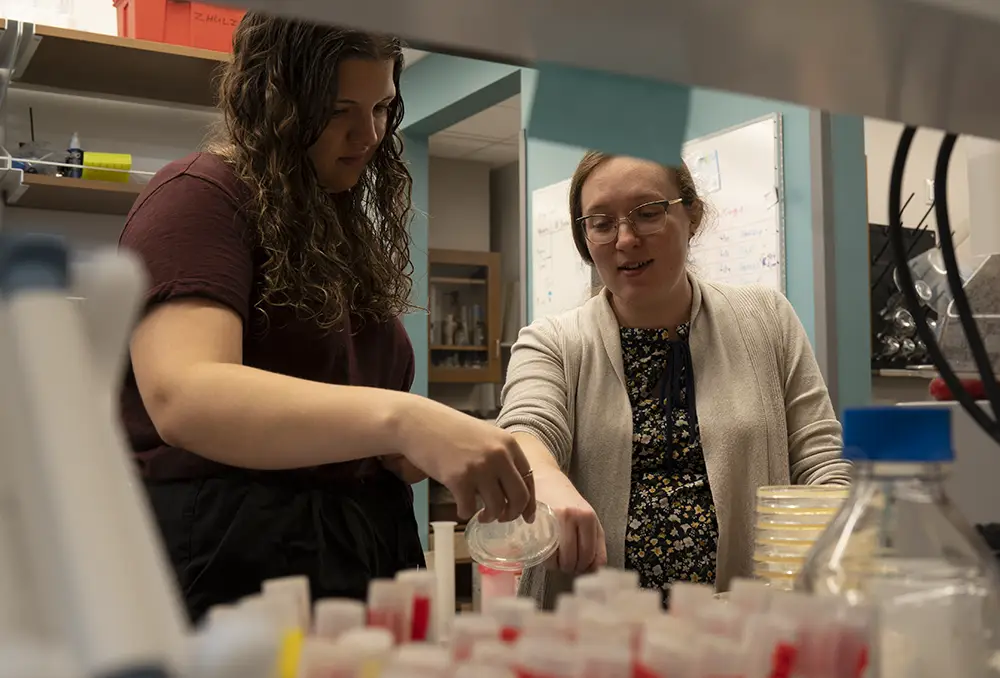Undergraduate Research Initiative Welcomes Students With Hearing Loss

by Amy Beth Miller
About three dozen students who are deaf or hard of hearing (DHH) have conducted research in recent years through the Department of Biochemistry and Cellular and Molecular Biology (BCMB) at the University of Tennessee, Knoxville.
Professor Gladys Alexandre has been working with DHH students since 2016, and the effort has expanded to other labs.
“We have training and mentoring for all advisors, and this helps promote the Deaf culture in the hearing community and better prepare diverse scientists to host these underrepresented individuals,” said Alexandre, now BCMB department head. “We are helping the campus to become more welcoming to DHH students.”
Recruiting
Alexandre was director of the Program for Excellence and Equity in Research (PEER), which focuses on recruiting and training underrepresented students in science, technology, engineering, and math (STEM) fields. “There are many pools of talents that have not been fully tapped for the benefits of our society, and in my case, research, DHH students represent such an overlooked pool of talents,” she said.
The director of the UT Center on Deafness, David Smith, connected Alexandre with colleagues from the National Technical Institute for the Deaf at the Rochester Institute of Technology (NTID/RIT), where she started recruiting undergraduate students as a pilot. Since then, BCMB Professors Tessa (Burch-Smith) Calhoun, Liz Howell, and Dan Roberts also have hosted students from NTID during the summer.
Data from those experiences helped BCMB receive its first National Science Foundation (NSF) Research Experience for Undergraduates (REU) award in 2019 under Roberts, who is now retired. Professor Elena Shpak received a 2023 NSF REU award to continue BCMB’s efforts through summer 2026.
Alexandre also has budgeted funding from her own NSF awards to train DHH students in research every summer.
One of the first graduate students Alexandre recruited from NTID/RIT was Amie Fornah Sankoh, whose PhD from BCMB in 2023 made her the first deaf Black woman to earn a STEM doctorate in the United States, according to Chemistry World.
BCMB also recruits DHH students through colleagues at Gallaudet and other universities, plus it is on an NSF REU site that prospective students can consult to find research opportunities.
Rethinking communication
Alexandre did not have previous experience with a person who has hearing loss but said communicating was not as challenging as she anticipated. “It simply needs to slow down and to be as clear as possible,” she said. “We use writing, a few ASL [American Sign Language] signs we know, [PowerPoint] captions, and ASL interpreters to communicate.”
“Being flexible and open-minded goes a long way to effectively communicate with DHH individuals,” she said. “This is also not a heterogenous group: Some students sign, some don’t, some can lip-read, many can’t.”
Each lab’s principal investigator and in-lab mentor—a graduate student or post-doctoral researcher—completes online training through Project Access (For Educators) on understanding hearing loss and improving communication. “We then have a meeting where we discuss expectations and how to set up the projects for success,” Alexandre said. “We specifically discuss what worked and didn’t work so that we can improve every year.”
“We also ask that the lab writes detailed protocols and provide them in advance and then demonstrate them,” she said, noting that advance access is critical for the students who are deaf or hard of hearing to have time to become familiar with the material.
“As long as I am funded, I will continue this effort,” Alexandre said. “It is transformative for all involved, and it definitely enhances communication between the lab members. Taking the time to explain difficult concepts using a variety of approaches is incredibly effective, but it takes a lot more time.”
She noted that clearer nonverbal communication also benefits individuals who are not deaf but may have difficulty hearing.
BCMB’s efforts to improve diversity and create a welcoming community are receiving recognition. Alexandre received the 2019 American Society for Microbiology William A. Hinton Award for the Advancement of a Diverse Community of Microbiologists and a 2022 NTID Co-op and Career Center Outstanding Employer Partner Award.